Christopher Allen's Blog, page 5
July 30, 2017
Deadline Approaching! Just Hours Left!
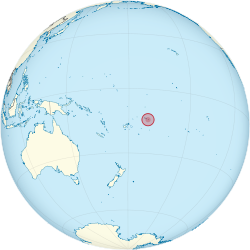 Are you wondering if the ship has sailed without you? Are you putting the last touches on your travel piece for the 2017 I Must Be Off! Travel Writing Competition? Did you know that the deadline is today? When the clock turns over to August 1 in American Samoa, the I Must Be Off! ship will have sailed. Don't miss the deadline. Just click on the link below to find out what time it is in American Samoa--the last place on Earth to enjoy July 31, 2017.
Are you wondering if the ship has sailed without you? Are you putting the last touches on your travel piece for the 2017 I Must Be Off! Travel Writing Competition? Did you know that the deadline is today? When the clock turns over to August 1 in American Samoa, the I Must Be Off! ship will have sailed. Don't miss the deadline. Just click on the link below to find out what time it is in American Samoa--the last place on Earth to enjoy July 31, 2017.https://www.timeanddate.com/worldcloc...
I must be off,
Christopher
______________________________________________
Christopher Allen is the managing editor at SmokeLong Quarterly. His debut flash fiction collection is forthcoming from Matter Press. Allen's fiction has appeared or is forthcoming in [PANK], Indiana Review, Juked, FRiGG, The Journal of Compressed Creative Arts and others. Read his book reviews in Necessary Fiction, The Lit Pub, Fiction Southeast and others. In 2017 Allen was both a finalist (as translator) and semifinalist for The Best Small Fictions. He lives somewhere in Europe--for now.
Published on July 30, 2017 21:31
May 27, 2017
Publishing News -- Exeter Writers Short Story Competition
 I've been rocking third place lately. That's a personal criticism as well as a sincere shout-out of gratitude to the competitions who've chosen my work: placing, long list, shortlist, whatever. I'm thankful to be at the party. I say that a lot, but I mean it. I know there are throngs of great writers out there, and I know I can learn a lot from them. The Reflex Fiction competition is underway. I read the stories every day and think WOW. There are so many writers out there who really get the tempo and urgency of flash. For
SmokeLong Quarterly
, I read 5000 flash fiction submissions a year. Very brief fiction and non-fiction must move. It has to start in exactly the right place and end there too. You can't waste words.
I've been rocking third place lately. That's a personal criticism as well as a sincere shout-out of gratitude to the competitions who've chosen my work: placing, long list, shortlist, whatever. I'm thankful to be at the party. I say that a lot, but I mean it. I know there are throngs of great writers out there, and I know I can learn a lot from them. The Reflex Fiction competition is underway. I read the stories every day and think WOW. There are so many writers out there who really get the tempo and urgency of flash. For
SmokeLong Quarterly
, I read 5000 flash fiction submissions a year. Very brief fiction and non-fiction must move. It has to start in exactly the right place and end there too. You can't waste words. We could all work harder, right? I don't know many writers who would say "I'm working too hard." My talented friend
Who doesn't want to be numero uno? After reading the winning stories in the competitions where I placed third, I can say that I agree wholeheartedly with the judges. Great stories, masterfully told. I'm inspired to work harder by the stories that won.
Speaking of working harder, are you a travel writer? Have you entered the 2017 I Must Be Off! Travel Writing Competition? We are in our fifth year. This year's judge is prolific travel writer Graham Mercer, and you can enter the competition FREE until May 31. From June 1 to July 31, the entry fee is a nominal €3. Go HERE for the guidelines.
I must be off,
Christopher
______________________________________________
Christopher Allen is the author of Conversations with S. Teri O'Type . His fiction has appeared or is forthcoming in The Dead Mule, FRiGG, Juked, The Journal of Compressed Creative Arts, Indiana Review, FIVE:2:ONE and over a hundred other journals. Allen's stories have been anthologized in the Bath Flash Fiction anthology, Eclectica Magazine's 20th-Anniversary Speculative anthology, SmokeLong Quarterly: the Best of the First Ten Years: 2003-2013, and others. Allen was both a finalist and semi-finalist for The Best Small Fictions 2017. He is a multiple nominee for the Pushcart Prize, Best of the Net, The Best Small Fictions, and storySouth's Million Writers Award. Since 2014 he has been the managing editor of SmokeLong Quarterly and as of 2017 a consulting editor for The Best Small Fictions.
Published on May 27, 2017 07:44
March 6, 2017
Why the Gods Have Great Bums
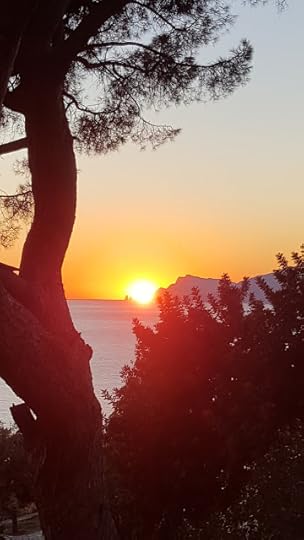 The sunset from our hotel in PrairanoThere's nothing I like more than hiking. Call it trekking, call it tramping, call it treading the path unbeaten--whatever you call it, please keep it coming. Actually, could someone send me a t-shirt that says I'D RATHER BE HIKING across the front? In black please.
The sunset from our hotel in PrairanoThere's nothing I like more than hiking. Call it trekking, call it tramping, call it treading the path unbeaten--whatever you call it, please keep it coming. Actually, could someone send me a t-shirt that says I'D RATHER BE HIKING across the front? In black please.I've hiked in South Tyrol, Austria, Mallorca, the British Midlands, New Zealand, British Columbia, South Africa, Nepal, and of course Germany where I live; but all of these pale slightly, at least in name, to THE PATH OF THE GODS! (Sentiero degli dei) near Naples, Italy on the Amalfi coast.
The path of the gods leads you along the Amalfi coast from Positano to Bomerano (although we, the rugged hardcore hikers that we are, walked to Bomerano from Furore). Most sites that provide information about the hike tell you that the path stops in Nocelle, but we found a path that leads down to Positano. Normally, though, most hikers stop in Nocelle and take the bus down to the sea (wusses).
When (not) to Go
Usually off-season is the best time to go anywhere if you want to get away from the crowds--as long as it's not a holiday weekend. So of course at the end of October 2016 we set off to the Amalfi Coast for a long holiday weekend to hike the path of the gods as many times as we can in four days. We stay in Prairano, a tiny village hanging from the cliffs of the Amalfi Coast. If you come here by car, there are free parking spaces above the village along the road. In the center of the village, take the road that goes up the mountain; don't waste time driving up and down the coastal road looking for a parking space on a holiday weekend.
Prairano is a good starting point for the path of the gods, but it is also a bit limited in terms of restaurants/nightlife--except for the two masked guys making cocktails on the street late on Halloween night, which is festive. They are also play-attacking people with a real cleaver.
If you choose to visit the Amalfi Coast on a holiday weekend, be prepared for massive delays on the coastal road. The bus trip back to Prairano from Positano takes an hour (8 km); you could walk faster. To be a bus driver on the Amalfi Coast one must be able to squeeze through the eye of the needle.
"Oh, don't go to Positano on the bus," our host at the hotel suggests. "You'll want to start here in Prairano. In Positano, you'll have to climb 1700 steps just to get to the sentiero degli dei."
"That's all?" I laugh: rugged.
"You'll want to save your knees," she says. "I've said this a hundred times to hikers much more rugged than you," she doesn't say--but her face says it.
We wisely take her suggestion and find the beginning of the path from Prairano. I don't know who counts these steps, but I'd say the number you have to climb to get to the path above Prairano is maybe just 10 or 20 fewer than the climb from Positano. The Gods must have great bums. Here are a few pics of the ascent--just to get to the path:
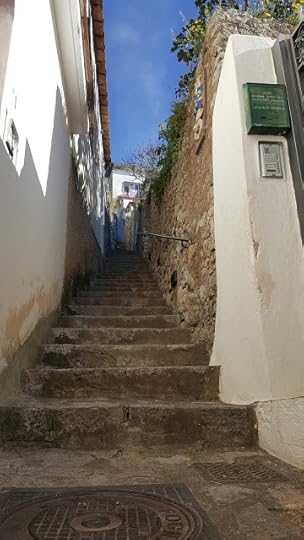
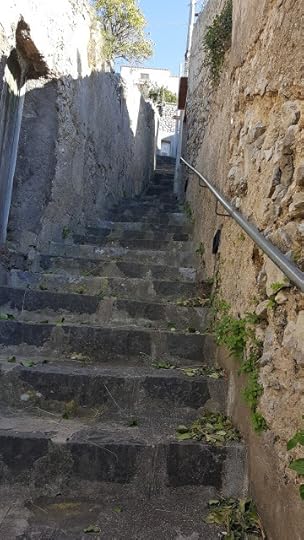
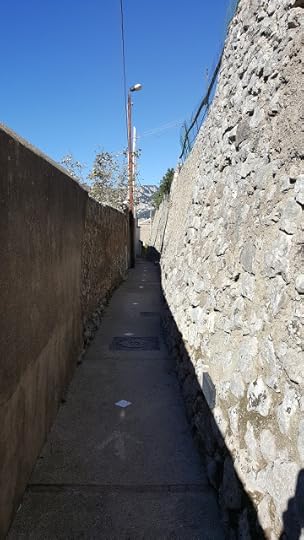
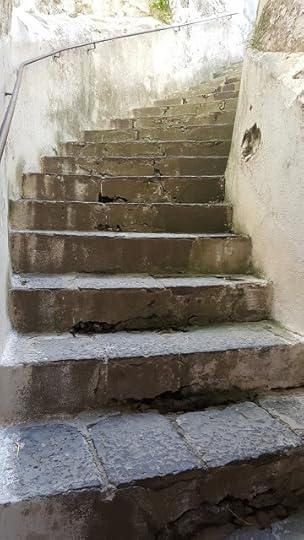
And so on. I could have taken a hundred more pictures of steps and steep paths, but I was busy not having a heart attack. It's up and up and up and up. Once, you're on the path it's relatively easy as long as you don't have fantasies of falling off a cliff. (I'm not saying I do, but I'm also not saying I don't.) For people who'd love to enjoy the view and their fantasies without the climb, there are ways to get up to the main trail without giving your glutes a workout, but why wouldn't you want to do this? After four days of climbing these steps, your glutes will be godly.
Another genesis of the name Sentiero degli dei might be that getting to the path might have killed some people, like sent them to Heaven, lent them their angel wings, tanked their ticker, etc. Seriously, if you're not in pretty good condition, take the bus up the mountain.
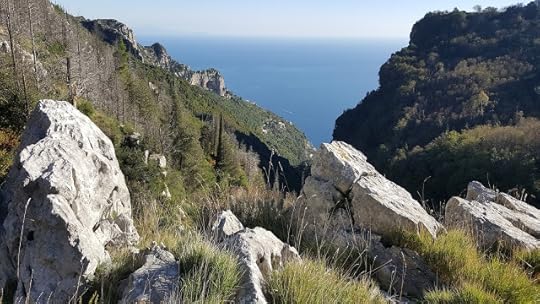
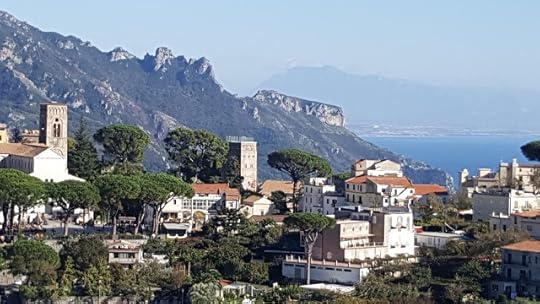
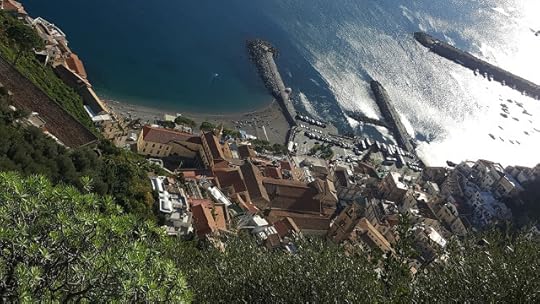
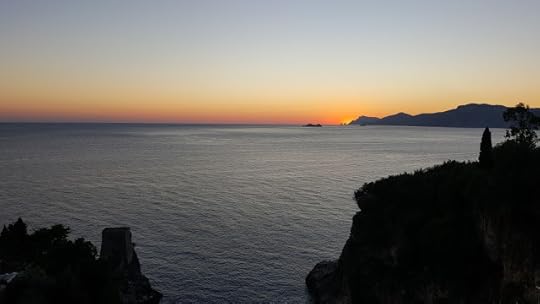
As any rugged hiker can tell you, going down the mountain is much worse for your joints than going up. Those 1700 steps down to Positano are weirdly spaced, derelict, crumbly, and--I can't emphasize this enough--there are 1700 of them. Supposedly. Really, who counts these things? If you have knee or marital problems, take the bus from Nocelle back to Positano. If you trip and break your ankle on this uneven, unkempt path, nobody will find you for hours, maybe days. We saw only one person from Nocelle to Positano.

For experienced hikers, the path of the gods is a bit boring at the top (notwithstanding the amazing views of course), but the climb is a grand workout. In summer bring lots of water, lots of sun lotion, and a mobile telephone in case of emergencies. You'll be in the sun most of the time, and there are few watering holes along the way--although you might find a guy selling drinks on the steps of an old church. I'm sure he makes a good living.
I must be off,
Christopher
Have you started writing your entry for the Fifth Annual I Must Be Off! Travel Writing Competition? Go HERE to read the Guidelines.
__________________________________________________
Christopher Allen is the author of Conversations with S. Teri O'Type (a Satire), an episodic adult cartoon about a man struggling with expectations. Allen's writing has appeared, or is forthcoming, in FRiGG, Eclectica Magazine's 20th-Anniversary Speculative anthology, Indiana Review, Night Train, Juked, SmokeLong Quarterly: the Best of the First Ten Years anthology, The Journal of Compressed Creative Arts, [PANK] blog, Necessary Fiction, Word Riot, Bootsnall Travel, Chicken Soup for the Soul and lots of other good places. A finalist at Glimmer Train in 2011, Allen is a multiple nominee for the Pushcart Prize, Best of the Net, Best Small Fictions, storySouth's Million Writers Award and others.
Published on March 06, 2017 09:53
February 26, 2017
The Fifth Annual I Must Be Off! Travel Writing Competition
It's that time of year again! Time to type up those travel articles, travel anecdotes and travel reflections. We want to read about that place that changed you, about the experiences you can't wait to share with other travelers. Whether your work is humorous, informative, quirky or profound--send it in. This year, submissions are free until May 31; afterward there will be a nominal charge (see below). The purpose for this twofold: to prevent what happened last year (300 submissions in the last two weeks) and to perhaps add a bit of money to the prize pot. All proceeds from entry fees will go towards the prize money.
Previous Winners and Placers:
"Wild Encounter" by Graham Mercer (UK, Tanzania)
"The Seven Headless Dwarfs" by Matthew Wolfe (US)
"A Kiss of Oranges and Myrtle on Crete" by Mihaela Lica Butler
"A Leaf on the Wind" by Joel Hindson (UK)
"Burning My Boots in Cabo Fisterra" by Gabriella Brand (US)
"Discovering Hến Rice in Central Việt Nam" by Chris Galvin (Canada, Vietnam)
"Oh, Calcutta" by Paola Fornari (Tanzania, now Ghana)
"The Scarlet Mile" by Gillian Brown (Scotland, now France)
"Bodrum, Turkey's San Tropez" by Jack Scott (Australia, now Turkey)
"The Children of Chitwan, Nepal" by Hannah Thompson-Yates (UK, now Hong Kong)
"God's Own Country" by Saahil Acharya (India)
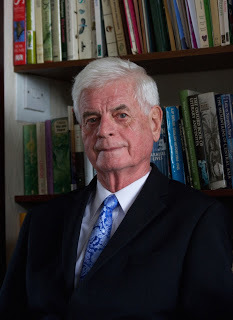 Graham MercerThe 2017 Judge -- Graham Mercer
Graham MercerThe 2017 Judge -- Graham Mercer
Born in St Helens, England, Graham Mercer won the BBC Wildlife Magazine’s “Award for Nature Writing” in 1988 and has published 15 books, including two coffee table editions and guidebooks to Tanzania’s major national parks and to Zanzibar. Mercer has also published many magazine articles, mostly on Tanzania’s parks and wildlife, and has won or been runner-up in nine writing competitions, including the 2016 I Must Be Off! Travel Writing Competition in which he took first place.
Mercer is a member of International MENSA and a Fellow of the Royal Geographic Society.
He and his wife left Tanzania in 2012 to live in Cheshire, England, where he is presently writing his “safari memoirs” and adjusting, with glacial slowness and the aid of four heavy sweaters and a succession of long johns, to the northern English climate.
Read an interview with Graham Mercer for some tips about travel writing.
Submission Guidelines:
Maximum 1000 wordsEdited for spelling, grammar and punctuationUp to three photos may be submitted with your entry. Photos are not necessary to win.Previously unpublished work only! Blog posts are considered published.No entry fee until May 31. Simply mail your entry and 50-word bio to christopher@imustbeoff.com. From June 1 to July 31 there is a €3 entry fee payable via PayPal. To enter after May 31, follow these steps: At PayPal pay €3 fee to christopher@imustbeoff.comImportant: Have your travel article submission and bio ready! Forward your PayPal confirmation of payment/receipt to christopher@imustbeoff.com with your travel article attached to the email and your 50-word bio in the body of the email. Please put TRAVEL WRITING CONTEST in the subject field.You will receive a confirmation from I Must Be Off! that your submission has been received and that you have been entered into the competition. This is not an automatic notification, so please be patient if it takes a few hours. Open to anyone worldwide, but you need (access to) a PayPal account if you enter after May 31 and in case you win.Entries must be in English One entry per person until May 31. After May 31, you may enter as many times as you like. Each entry must be separate and accompanied by an entry fee, €3 each.Deadline for submissions: July 31, 2017Entries will be read blind by this year's judge and travel writer, Graham Mercer. It is not necessary to delete identifying information from your entry. If your name appears anywhere, it will be removed before it's forwarded to the judge.Word doc, docx and rtf files only. Finalists announced in mid-September. Winners announced and published in autumn 2017.
The Prizes:
The Top entries will be published at I Must Be Off! with authors' permission. Authors retain copyright.First place prize: €200Second place prize: €50Readers' Choice Award: €50 based on unique hits and comments tallied on October 30.All proceeds from entry fees will be added to these amounts.
Good luck and happy writing!
I must be off,
Christopher
_________________________________________
Christopher Allen is the author of Conversations with S. Teri O'Type (a Satire), an episodic adult cartoon about a man struggling with expectations. Allen's writing has appeared, or is forthcoming, in FRiGG, Eclectica Magazine's 20th-Anniversary Speculative anthology, Indiana Review, Night Train, Juked, SmokeLong Quarterly: the Best of the First Ten Years anthology, The Journal of Compressed Creative Arts, [PANK] blog, Necessary Fiction, Word Riot, Bootsnall Travel, Chicken Soup for the Soul and lots of other good places. A finalist at Glimmer Train in 2011, Allen is a multiple nominee for the Pushcart Prize, Best of the Net, Best Small Fictions, storySouth's Million Writers Award and others.
Previous Winners and Placers:
"Wild Encounter" by Graham Mercer (UK, Tanzania)
"The Seven Headless Dwarfs" by Matthew Wolfe (US)
"A Kiss of Oranges and Myrtle on Crete" by Mihaela Lica Butler
"A Leaf on the Wind" by Joel Hindson (UK)
"Burning My Boots in Cabo Fisterra" by Gabriella Brand (US)
"Discovering Hến Rice in Central Việt Nam" by Chris Galvin (Canada, Vietnam)
"Oh, Calcutta" by Paola Fornari (Tanzania, now Ghana)
"The Scarlet Mile" by Gillian Brown (Scotland, now France)
"Bodrum, Turkey's San Tropez" by Jack Scott (Australia, now Turkey)
"The Children of Chitwan, Nepal" by Hannah Thompson-Yates (UK, now Hong Kong)
"God's Own Country" by Saahil Acharya (India)
 Graham MercerThe 2017 Judge -- Graham Mercer
Graham MercerThe 2017 Judge -- Graham MercerBorn in St Helens, England, Graham Mercer won the BBC Wildlife Magazine’s “Award for Nature Writing” in 1988 and has published 15 books, including two coffee table editions and guidebooks to Tanzania’s major national parks and to Zanzibar. Mercer has also published many magazine articles, mostly on Tanzania’s parks and wildlife, and has won or been runner-up in nine writing competitions, including the 2016 I Must Be Off! Travel Writing Competition in which he took first place.
Mercer is a member of International MENSA and a Fellow of the Royal Geographic Society.
He and his wife left Tanzania in 2012 to live in Cheshire, England, where he is presently writing his “safari memoirs” and adjusting, with glacial slowness and the aid of four heavy sweaters and a succession of long johns, to the northern English climate.
Read an interview with Graham Mercer for some tips about travel writing.
Submission Guidelines:
Maximum 1000 wordsEdited for spelling, grammar and punctuationUp to three photos may be submitted with your entry. Photos are not necessary to win.Previously unpublished work only! Blog posts are considered published.No entry fee until May 31. Simply mail your entry and 50-word bio to christopher@imustbeoff.com. From June 1 to July 31 there is a €3 entry fee payable via PayPal. To enter after May 31, follow these steps: At PayPal pay €3 fee to christopher@imustbeoff.comImportant: Have your travel article submission and bio ready! Forward your PayPal confirmation of payment/receipt to christopher@imustbeoff.com with your travel article attached to the email and your 50-word bio in the body of the email. Please put TRAVEL WRITING CONTEST in the subject field.You will receive a confirmation from I Must Be Off! that your submission has been received and that you have been entered into the competition. This is not an automatic notification, so please be patient if it takes a few hours. Open to anyone worldwide, but you need (access to) a PayPal account if you enter after May 31 and in case you win.Entries must be in English One entry per person until May 31. After May 31, you may enter as many times as you like. Each entry must be separate and accompanied by an entry fee, €3 each.Deadline for submissions: July 31, 2017Entries will be read blind by this year's judge and travel writer, Graham Mercer. It is not necessary to delete identifying information from your entry. If your name appears anywhere, it will be removed before it's forwarded to the judge.Word doc, docx and rtf files only. Finalists announced in mid-September. Winners announced and published in autumn 2017.
The Prizes:
The Top entries will be published at I Must Be Off! with authors' permission. Authors retain copyright.First place prize: €200Second place prize: €50Readers' Choice Award: €50 based on unique hits and comments tallied on October 30.All proceeds from entry fees will be added to these amounts.
Good luck and happy writing!
I must be off,
Christopher
_________________________________________
Christopher Allen is the author of Conversations with S. Teri O'Type (a Satire), an episodic adult cartoon about a man struggling with expectations. Allen's writing has appeared, or is forthcoming, in FRiGG, Eclectica Magazine's 20th-Anniversary Speculative anthology, Indiana Review, Night Train, Juked, SmokeLong Quarterly: the Best of the First Ten Years anthology, The Journal of Compressed Creative Arts, [PANK] blog, Necessary Fiction, Word Riot, Bootsnall Travel, Chicken Soup for the Soul and lots of other good places. A finalist at Glimmer Train in 2011, Allen is a multiple nominee for the Pushcart Prize, Best of the Net, Best Small Fictions, storySouth's Million Writers Award and others.
Published on February 26, 2017 11:56
February 24, 2017
To Carry Her Home: The Bath Flash Fiction Anthology Volume One
 I won a beauty contest! No kidding. But it's not what you think. I learned that my story had made the shortlist in the Bath Flash Fiction competition while I was hiking the Sentiero degli dei (the Path of the Gods) on the Amalfi Coast, so of course the memory of my trip to Naples will always be infused with the frustration of trying to find a hotspot so I could find out if I'd won. Sadly, I found out that I hadn't won as I was roaming the narrow but quaint alleys of Ravello. You win some; you lose some.
I won a beauty contest! No kidding. But it's not what you think. I learned that my story had made the shortlist in the Bath Flash Fiction competition while I was hiking the Sentiero degli dei (the Path of the Gods) on the Amalfi Coast, so of course the memory of my trip to Naples will always be infused with the frustration of trying to find a hotspot so I could find out if I'd won. Sadly, I found out that I hadn't won as I was roaming the narrow but quaint alleys of Ravello. You win some; you lose some. So how happy was I to discover this week that the good people at Bath Flash Fiction (BFF) chose the title of my story for the title of the anthology? That's right: I sort of won a title beauty contest. Finally.
In support of my new BFF and international flash fiction in general, I'll be giving away a copy of the book here. Keep an eye on I Must Be Off! for details.
We will also be opening submissions soon for the I Must Be Off! Travel Writing Competition, so start getting those travel articles polished. This year submissions will be free of charge until May 31; afterwards, each submission will cost 3 euros via PayPal. All proceeds will go towards the prize money.
I must be off,
Christopher
______________________________________________
Christopher Allen is the author of Conversations with S. Teri O'Type . His fiction has appeared or is forthcoming in FRiGG, Juked, The Journal of Compressed Creative Arts, Indiana Review, FIVE:2:ONE and over a hundred other journals. Allen's stories have been anthologized in the Bath Flash Fiction anthology, Eclectica Magazine's 20th-Anniversary Speculative anthology, SmokeLong Quarterly: the Best of the First Ten Years: 2003-2013, and others. He is a multiple nominee for the Pushcart Prize, Best of the Net, Best Small Fictions, and storySouth's Million Writers Award. Since 2014 he has been the managing editor of SmokeLong Quarterly and as of 2017 a consulting editor for Best Small Fictions.
Published on February 24, 2017 12:44
February 4, 2017
High Heels Travel Agony in Athens by Mihaela Lica-Butler
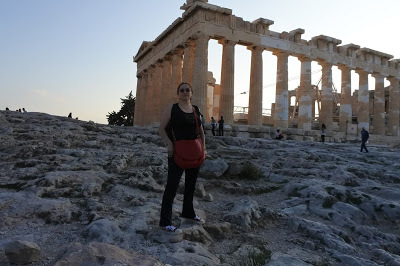 Mihaela Lica-Butler at the Acropolis“Oh, I love your boots!” chirped Eleni.And I am happy. I love my boots too. They are John Galliano knee platforms, brown, high, and perfect in every way. I love all my boots, but these are insanely high, and I take great joy in dissing the wiseacres who advocate no-heels, fugly all-terrain sneakers: “Wear comfortable shoes,” they insist.“My heels are f...ing all-terrain,” I think, but never utter the words. ‘Coz what do they know? I only believe in high heels. But it figures, in Athens’s case, they know better. So bear with me. Eleni is not the first to notice my boots. The cab driver last night gaped at my heels for a while. I thought he had a thing for feet and I ignored him. He spoke no English, but somehow he managed to understand our destination, a poorly pronounced “Stratos Vassilikos Hotel” my husband blabbered at him. Then the episode became a memory – one of those apparently forgettable moments that come back to haunt you when you least expect them. And it would come back with a vengeance.Early this morning, the PR chick who greeted us cheerfully in front of the breakfast lounge looked at these damn boots too. But she said nothing. Instead, she just asked:“Was everything OK with your room?”Yeah, everything was OK, although I thought, for the life of me, I still cannot figure out why Stratos is advertised as a five-star hotel.“Is there any hair salon nearby?” I ask without high expectations. There’s no way I will have my hair done in time for the event we have to attend at lunch.“You can have your hair done here,” she says with a smile that looks like a childhood memory.“For free,” she adds.“Oh?” I say, and as the response leaves my lips, I think “this is five-star treatment.” Then I ask “When?”“Right now if Eleni is free,” she tells me - and that smile never leaves her face.I like this girl, I think, and head to our breakfast table, in time to learn from my husband that there’s only fruit and bread for vegans. Well, I am not hardcore. I do vegetarian. But I love complaining, and I am thinking “Back to three stars on TripAdvisor for Stratos.”I don’t even finish the thought, and the cheerful PR chick arrives at our table with a Playmobil toy and a free ice cream coupon for my child. “OK, four stars,” I think.
Mihaela Lica-Butler at the Acropolis“Oh, I love your boots!” chirped Eleni.And I am happy. I love my boots too. They are John Galliano knee platforms, brown, high, and perfect in every way. I love all my boots, but these are insanely high, and I take great joy in dissing the wiseacres who advocate no-heels, fugly all-terrain sneakers: “Wear comfortable shoes,” they insist.“My heels are f...ing all-terrain,” I think, but never utter the words. ‘Coz what do they know? I only believe in high heels. But it figures, in Athens’s case, they know better. So bear with me. Eleni is not the first to notice my boots. The cab driver last night gaped at my heels for a while. I thought he had a thing for feet and I ignored him. He spoke no English, but somehow he managed to understand our destination, a poorly pronounced “Stratos Vassilikos Hotel” my husband blabbered at him. Then the episode became a memory – one of those apparently forgettable moments that come back to haunt you when you least expect them. And it would come back with a vengeance.Early this morning, the PR chick who greeted us cheerfully in front of the breakfast lounge looked at these damn boots too. But she said nothing. Instead, she just asked:“Was everything OK with your room?”Yeah, everything was OK, although I thought, for the life of me, I still cannot figure out why Stratos is advertised as a five-star hotel.“Is there any hair salon nearby?” I ask without high expectations. There’s no way I will have my hair done in time for the event we have to attend at lunch.“You can have your hair done here,” she says with a smile that looks like a childhood memory.“For free,” she adds.“Oh?” I say, and as the response leaves my lips, I think “this is five-star treatment.” Then I ask “When?”“Right now if Eleni is free,” she tells me - and that smile never leaves her face.I like this girl, I think, and head to our breakfast table, in time to learn from my husband that there’s only fruit and bread for vegans. Well, I am not hardcore. I do vegetarian. But I love complaining, and I am thinking “Back to three stars on TripAdvisor for Stratos.”I don’t even finish the thought, and the cheerful PR chick arrives at our table with a Playmobil toy and a free ice cream coupon for my child. “OK, four stars,” I think. Yianna Lo Daskalopoulou -- Five-star Smile at Stratos“Eleni is free when you are ready,” she tells me.“Five stars!” my brain races. What’s up with that smile? It is open, honest, and it never leaves her face.“I’ll be done in five minutes,” I say, and I finish my piece of fruit.Now I sit in this tiny room, facing a half-wall mirror, and Eleni chirps behind me: “I love your boots!”Well, I love my boots too. What’s not to love about Galliano?Then we chat.Eleni makes me laugh. She asks about my event. It’s a DigiTravel convention, and I am supposed to be a speaker. I mention how much I fear public speaking - I’d rather deal with a snake than face a crowd. She gets ophiophobia.“If I have beautiful hair, maybe they don’t notice how nervous I am,” I half-joke.She gets that too, laughing out loud, but she turns back to the boots: “You need comfy shoes.”“Know-it-all,” I think, but instead I answer “I was born in high heels.”She laughs again, and we continue chitchatting till my hair looks like a million bucks.“I could never walk in your boots from here to the National Hellenic Research Foundation,” she tells me as she sprays L'Oréal or some other finishing fixer over my hair. Right now I ignore her remark, but I’ll grow to regret it. By lunch, there’ll be blood in my boots.High heels are impossible in Athens.
Yianna Lo Daskalopoulou -- Five-star Smile at Stratos“Eleni is free when you are ready,” she tells me.“Five stars!” my brain races. What’s up with that smile? It is open, honest, and it never leaves her face.“I’ll be done in five minutes,” I say, and I finish my piece of fruit.Now I sit in this tiny room, facing a half-wall mirror, and Eleni chirps behind me: “I love your boots!”Well, I love my boots too. What’s not to love about Galliano?Then we chat.Eleni makes me laugh. She asks about my event. It’s a DigiTravel convention, and I am supposed to be a speaker. I mention how much I fear public speaking - I’d rather deal with a snake than face a crowd. She gets ophiophobia.“If I have beautiful hair, maybe they don’t notice how nervous I am,” I half-joke.She gets that too, laughing out loud, but she turns back to the boots: “You need comfy shoes.”“Know-it-all,” I think, but instead I answer “I was born in high heels.”She laughs again, and we continue chitchatting till my hair looks like a million bucks.“I could never walk in your boots from here to the National Hellenic Research Foundation,” she tells me as she sprays L'Oréal or some other finishing fixer over my hair. Right now I ignore her remark, but I’ll grow to regret it. By lunch, there’ll be blood in my boots.High heels are impossible in Athens.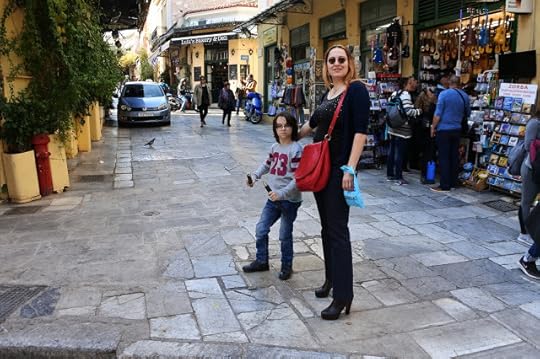 Pláka, AthensThe sidewalks are narrow, full of holes, and irregular in the neighborhood from Stratos to the conference venue. We didn’t have time to explore more than this part of the city and Pláka. Hopelessly optimistic, I think maybe the rest of Athens is more suitable for my vice, but for now, my boots are not made for walking. Only two kilometers separate our hotel from the venue of the National Hellenic Research Foundation. The walk takes us on asphalt walkways even a row of ducklings would find challenging to follow - high heeled, barefoot, or all-terrain sneakered. Heck, Cretan goats would snigger at the thought of walking down Athens’s sidewalks.Still, somehow I managed. I walked the walk, with a couple of unscheduled stops to a tavern and a minimart, acting all excited about discovering the places while secretly wishing for a saw of any kind to get rid of the heels.Business all behind us, we plan a trip to Pláka and the Acropolis. I have nothing but my Gallianos to wear. “You must be out of your mind,” a colleague says visibly amused looking at my boots. “You’ll not even make it 10 meters in Pláka!” he adds with a smirk on his face. “I’ll buy a pair of slippers, or something,” I argue, but the man keeps on smirking.“Good luck with that,” he says, visibly amused.
Pláka, AthensThe sidewalks are narrow, full of holes, and irregular in the neighborhood from Stratos to the conference venue. We didn’t have time to explore more than this part of the city and Pláka. Hopelessly optimistic, I think maybe the rest of Athens is more suitable for my vice, but for now, my boots are not made for walking. Only two kilometers separate our hotel from the venue of the National Hellenic Research Foundation. The walk takes us on asphalt walkways even a row of ducklings would find challenging to follow - high heeled, barefoot, or all-terrain sneakered. Heck, Cretan goats would snigger at the thought of walking down Athens’s sidewalks.Still, somehow I managed. I walked the walk, with a couple of unscheduled stops to a tavern and a minimart, acting all excited about discovering the places while secretly wishing for a saw of any kind to get rid of the heels.Business all behind us, we plan a trip to Pláka and the Acropolis. I have nothing but my Gallianos to wear. “You must be out of your mind,” a colleague says visibly amused looking at my boots. “You’ll not even make it 10 meters in Pláka!” he adds with a smirk on his face. “I’ll buy a pair of slippers, or something,” I argue, but the man keeps on smirking.“Good luck with that,” he says, visibly amused. It’s November, you know, and we soon learn that all shops that usually sell the famous Athens sandals are closed. But Pláka is still touristy, and busy, and many shops stay open year round.
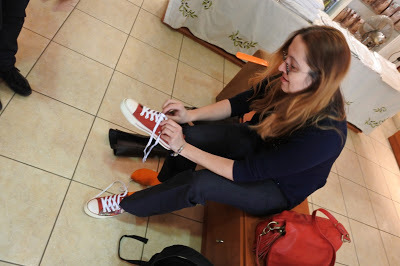 I need to take these boots off. Pláka is worse than the sidewalks. It’s cobbled and full of patches closed down to pedestrian traffic for repairs. Every step hurts - there’s no plain, leveled path to walk on. In agony, we enter every single shop/ boutique on the way, desperately looking for sandals, or (oh my God!) flip flops, or… anything to cover my aching feet before I just give up and take off the boots and walk barefoot. And here they are… the dreaded canvas sneakers I frown upon every time I people-watch in Trier. It’s the only shop in Pláka so far selling any kind of footwear, and we’ve been exploring for more than an hour. As much as I don’t want to, I sit down and try on a pair. They are red, they match nothing, and I know I will probably never wear them again after today. But they fit. Blissfully so.My husband laughs and takes pictures. As much as I hate it, I laugh too. Oddly, this is a learning moment: sometimes people are right in recommending “comfy” shoes. Red textile sneakers on my feet, a plastic bag carrying my Gallianos in one hand, and a backpack of souvenirs on my back, I am now ready to face the Acropolis. Can you imagine hiking up this rock on high heels?
I need to take these boots off. Pláka is worse than the sidewalks. It’s cobbled and full of patches closed down to pedestrian traffic for repairs. Every step hurts - there’s no plain, leveled path to walk on. In agony, we enter every single shop/ boutique on the way, desperately looking for sandals, or (oh my God!) flip flops, or… anything to cover my aching feet before I just give up and take off the boots and walk barefoot. And here they are… the dreaded canvas sneakers I frown upon every time I people-watch in Trier. It’s the only shop in Pláka so far selling any kind of footwear, and we’ve been exploring for more than an hour. As much as I don’t want to, I sit down and try on a pair. They are red, they match nothing, and I know I will probably never wear them again after today. But they fit. Blissfully so.My husband laughs and takes pictures. As much as I hate it, I laugh too. Oddly, this is a learning moment: sometimes people are right in recommending “comfy” shoes. Red textile sneakers on my feet, a plastic bag carrying my Gallianos in one hand, and a backpack of souvenirs on my back, I am now ready to face the Acropolis. Can you imagine hiking up this rock on high heels?__________________________________________
 Mihaela Lica-Butler
is travel writer and travel public relations pro, lover of cultures and cuisine. She has built a fun career while chiming in on many topics, from relating the trials and tribulations of the people of Kosovo, to experiencing, first hand, the heroics of the Romanian soldiers serving for the UN. But she thrives in conveying her love for travel and places in written word, and she is happy to be a constant contributor for some of the world's best travel sites.
Mihaela Lica-Butler
is travel writer and travel public relations pro, lover of cultures and cuisine. She has built a fun career while chiming in on many topics, from relating the trials and tribulations of the people of Kosovo, to experiencing, first hand, the heroics of the Romanian soldiers serving for the UN. But she thrives in conveying her love for travel and places in written word, and she is happy to be a constant contributor for some of the world's best travel sites.
Published on February 04, 2017 11:33
January 23, 2017
A Country Divided
 The Western Wall, JerusalemIt is difficult these days to think about anything but the mess US-Americans are making of the country. I wanted to write a humorous, entertaining post about my trip to Israel, but I'm not going to do that. Instead, I'm going to tell you about a country deeply divided by resentment and the need for retribution.
The Western Wall, JerusalemIt is difficult these days to think about anything but the mess US-Americans are making of the country. I wanted to write a humorous, entertaining post about my trip to Israel, but I'm not going to do that. Instead, I'm going to tell you about a country deeply divided by resentment and the need for retribution. 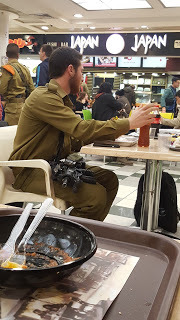 A gun pointed at me the whole timeTev Aviv--a patchwork of modern and ancient, polite and impolite, slick and filthy--has everything you'd expect from a large, multicultural city. To answer this question for the hundredth time, we felt safe. And that's saying a lot since our hotel was in a derelict area along the marina where the only open venue was a strip club. Just two streets in any direction was perfectly normal. We can pick them.
A gun pointed at me the whole timeTev Aviv--a patchwork of modern and ancient, polite and impolite, slick and filthy--has everything you'd expect from a large, multicultural city. To answer this question for the hundredth time, we felt safe. And that's saying a lot since our hotel was in a derelict area along the marina where the only open venue was a strip club. Just two streets in any direction was perfectly normal. We can pick them.Most US-Americans who travel to Israel on vacation are probably not going to stay in Tel Aviv unless they're going there for the nightlife or the beach. Most US-Americans are going to head to Jerusalem, which is actually just 33 miles away from Tel Aviv. You'll probably fly into Tel Aviv to get to Jerusalem, so why not spend a few days there? At least you'll find a restaurant. Restaurants in Jerusalem are pretty scarce.
 Jerusalem is a divided city. Men from women. Muslim from Jew, Greek Orthodox Christian from Armenian, the latter Christians by religion but considered Palestinians politically. The old town is a maze of narrow, often dirty, confusing passageways and stairs. It's a war-ish zone with armed soldiers and police officers everywhere. The tense atmosphere you missed in Tel Aviv? You'll find it in Jerusalem. Here is where you really get a taste of trouble seething just under the surface.
Jerusalem is a divided city. Men from women. Muslim from Jew, Greek Orthodox Christian from Armenian, the latter Christians by religion but considered Palestinians politically. The old town is a maze of narrow, often dirty, confusing passageways and stairs. It's a war-ish zone with armed soldiers and police officers everywhere. The tense atmosphere you missed in Tel Aviv? You'll find it in Jerusalem. Here is where you really get a taste of trouble seething just under the surface.The first time I was in Jerusalem, in 2008, I was struck by how rude the Greek Orthodox priests were at the Church of the Holy Sepulchre. I was infuriated when a man pushed my mother out of the way in the tunnel leading to the Western Wall plaza and then again when a child did the same thing on the Via Dolorosa. Pushing and shoving are apparently completely acceptable behavior in Jerusalem. To top that, we had one of the rudest, most inconsiderate tour guides I've had in my long life of travel. Jerusalem might be holy, but it's also bitter and unpleasant.
 Church of the Holy SepulchreThat's not to say there aren't friendly people. The guys who made my falafel were sweet, the guy sitting at the reception desk of the Erlöserkirche (Church of the Redeemer) was nice, the guy who showed me how to get to the Dome of the Rock from the Western Wall (the only way to get there for non-Muslims apparently) was nice but then asked me for money. The shops in the old town rely on tourists, so of course they're friendly. This place is not Venice, where an ever-flowing glut of tourists has turned many Venetians into rude assholes.
Church of the Holy SepulchreThat's not to say there aren't friendly people. The guys who made my falafel were sweet, the guy sitting at the reception desk of the Erlöserkirche (Church of the Redeemer) was nice, the guy who showed me how to get to the Dome of the Rock from the Western Wall (the only way to get there for non-Muslims apparently) was nice but then asked me for money. The shops in the old town rely on tourists, so of course they're friendly. This place is not Venice, where an ever-flowing glut of tourists has turned many Venetians into rude assholes. Christians visiting Jerusalem will probably need to visit the Church of the Holy Sepulchre and the Garden of Gethsemane. You'll probably wind up at the Western Wall and, like me, stand there for a while wondering what Hasidic Israelis think about tourists gawking at them while they pray. I felt really uncomfortable. I grew up knowing about the Western Wall, but of course being Christian I called it the Wailing Wall unaware that this is derogatory and that Jews would never use this name.
You should of course do those things, but by far the most important place to visit in Jerusalem is Yad Vashem, the museum and memorial to the Jewish people who were murdered by the National Socialists of Germany (and the complicitous masses) in World War II. It's forbidden to take pictures inside the museum, so of course I have no photos. I did, however, take lots of photos outside. Here are a few:
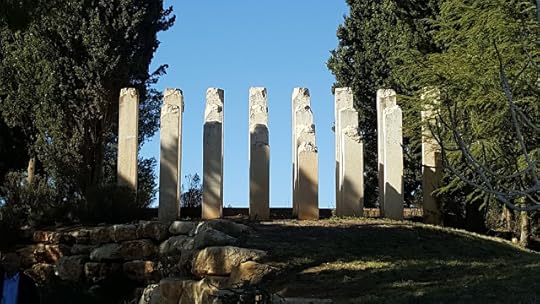 Above the Children's Memorial at Yad Vashem
Above the Children's Memorial at Yad Vashem
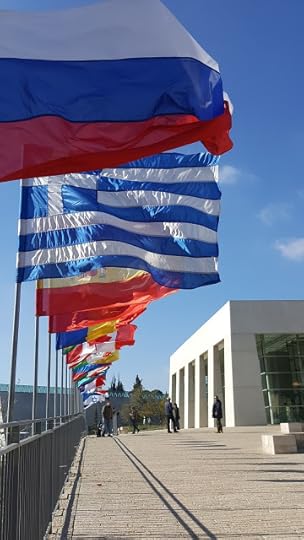 The entrance to Yad Vashem, Jerusalem
The entrance to Yad Vashem, Jerusalem
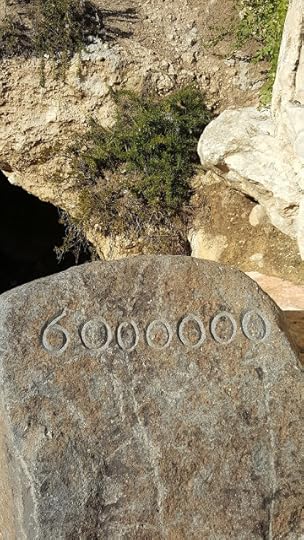 The stone memorializing the unknown victims of National Socialism
The stone memorializing the unknown victims of National Socialism
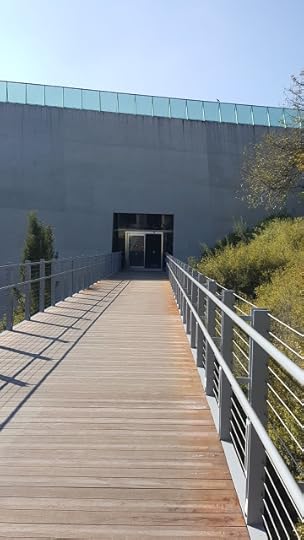 The entrance to the main museum/memorial at Yad Vashem
The entrance to the main museum/memorial at Yad Vashem
 Yad VashemI live in Germany, and I've seen more WWII documentaries than I can count. When I entered the museum/memorial, I knew what to expect of course. I knew that I would be sickened and overwhelmed by sadness the whole time. And I was. It is so important to visit this place. As a US-American it's especially important to visit Yad Vashem so that we see the methods and the rhetoric fascists use to take over a country, and what happens when a leader promises to make the country great again while denigrating a particular religious group. It is important for us all to remember this.
Yad VashemI live in Germany, and I've seen more WWII documentaries than I can count. When I entered the museum/memorial, I knew what to expect of course. I knew that I would be sickened and overwhelmed by sadness the whole time. And I was. It is so important to visit this place. As a US-American it's especially important to visit Yad Vashem so that we see the methods and the rhetoric fascists use to take over a country, and what happens when a leader promises to make the country great again while denigrating a particular religious group. It is important for us all to remember this.As we were leaving Tel Aviv to fly back to Berlin, we had a telling encounter with an airport employee who was helping us to the plane (we were traveling with a person in a wheelchair).
He started by telling us a Jewish joke (he was himself Jewish I assume). I don't remember it, but it enouraged us to laugh at how cheap and greedy the Jews supposedly are. I suppose he told us the joke to let us know the Jews have a sense of humor about the prejudice they've endured. We did not laugh.
"Just because we're here together," he struck a more serious tone, as if to say Just between us victims of Islamic terrorism. "What happened in Nice and at the Berlin Christmas market wouldn't happen in Israel. We're prepared. I can't believe the Germans aren't prepared for attacks like that."
"Yeah, that particular Christmas market in Berlin is sort of exposed to traffic," I offered. "But I was at one last week in Berlin that had cement barriers."
"After!" he said and laughed. "When I see two Arabs walking towards me," he continued, "I tense up. They want us dead."
Hmmm, I thought. OK. Maybe because you're not respecting the boundaries you agreed on in the 60s and you're building settlements on their land? But I didn't say this. Although I've done quite a bit of reading on the subject, I'm still not sure who's right and who's wrong here. It all feels wrong.
"And then Merkel," he went on, "letting them all in. Big mistake. I respect the East for standing up to her and not letting them in. The European multi-culti experiment didn't work!"
Hold on there. "But the East takes money from the EU," I said. "If they want money, they need to adhere to the policies of the EU, and one of them is that the burden of asylum seekers is shared. Out of the million or so people Germany let in, maybe a couple of thousand have caused problems."
And then he said it: "But if you know there's a snake in your house, you're always afraid." The Nazis used similar rhetoric to turn the country against the Jews. If anyone should know the danger of prejudice against an entire folk, it should be the Jews. I'm not trying to imply that this man represents the prevailing public opinion in Israel (and I don't have enough information to make assumptions about what Israelis think), but I do see it as a warning sign for my own country. If you demonize an entire group of people, you should probably expect that group of people to resent you.
 And, in fact, the truck ramming attack in Jerusalem happened the very next day.
And, in fact, the truck ramming attack in Jerusalem happened the very next day. Resentment breeds resentment, and none of us is immune. If you elect a President because you're angry that you can't discriminate against non-whites, non-Christians, and non-straights, then you're going to feel my resentment. If you're angry that I won't accept your President, my only response is that I will not tolerate intolerance. And so on. Your President is planning to abolish the National Endowments for the Arts and the Humanities, has removed climate change, LGBT, civil rights, and energy from its Top Issues on its website, and has assembled a cabinet of rich robber barons that do not have the best interests of US-Americans at heart and don't even have the experience to run their ministries. Education is nowhere among the priorities of this administration and quality health care will be the priviledge of the wealthy. Do I feel resentment? Loads of it.
Recently someone on Facebook remarked that it was shameful to boycott the inauguration; doing so, she said, was to disrespect the office of the President. On the contrary, allowing a man who brags about being able to sexually assault women because he's famous, a man who cons thousands of students out of their tuition, a man who does not pay his bills or his taxes, a man who tweets inflammatory and childish messages to political leaders--a man in short of the lowest moral character--to occupy the office of President of the United States is in itself disrespectful of that office.
This has not been a humorous, entertaining post about a beautiful place--I know. I'm afraid, at least for the time being, my posts will probably be less humorous and less entertaining than usual.
What I will do: I will remain vigilant. I will keep encouraging Trump's administration and the Republican Party to put education first not only for their children but for all US-Americans. A country cannot function without quality education and health care for all its citizens. If you don't believe this, you need to build a high-security electric fence around your property and stop calling yourself patriotic.
I must be off,
Christopher
____________________________________________________
Christopher Allen is the author of Conversations with S. Teri O'Type (a Satire), an episodic adult cartoon about a man struggling with expectations. Allen's writing has appeared or is forthcoming in Juked, Eclectica Magazine's 20th-Anniversary Speculative anthology, Indiana Review, FRiGG, The Journal of Compressed Creative Arts, and over a hundred other great places. Read his book reviews in [PANK], Necessary Fiction, Word Riot, The Lit Pub, and others. His creative non-fiction has appeared in Chicken Soup for the Soul, Bootsnall Travel, and lots of other fine places. A finalist at Glimmer Train in 2011, Allen has been nominated for Best of the Net, the storySouth Million Writers Award, and the Pushcart Prize. He is the 2015 recipient of Ginosko Literary Journal's award for flash fiction and in 2016 took third place in the K. Margaret Grossman fiction award given by Literal Latté. Allen is the managing editor of SmokeLong Quarterly.
Published on January 23, 2017 09:55
January 19, 2017
Racism and Immigration in the USA
 Eight years ago I was in Rome on a guided tour of the city. Our group was divided into two groups, one English-speaking and one Spanish/German-speaking. Because the Spanish/German-speaking group was quite small, I chose to go with that one. This is how I wound up touring Rome all day with three women from Germany.
Eight years ago I was in Rome on a guided tour of the city. Our group was divided into two groups, one English-speaking and one Spanish/German-speaking. Because the Spanish/German-speaking group was quite small, I chose to go with that one. This is how I wound up touring Rome all day with three women from Germany."You're voting for Obama, right?" One of the women asked in German in lieu of a How do you do? Germans can be quite forward about politics and have no qualms about asking who you're voting for.
I was actually planning to vote for Obama and had no problem telling the woman this. While her question was a bit rude and aggressive by US standards, it only tickled the margins of appropriate conversation. Back then.
Back then, politics seemed relatively normal. Obama was scandalously liberal and a bit too dark for some people--in short, he was history in the making--but it all seemed like something I could talk about with a stranger. The world is different now. No stranger has enough time for me to tell them how furious I am about our current political situation. I'd ruin their holiday. They'd be talking about the US-American guy who actually foamed at the mouth. Their grandchildren's grandchildren would be telling some mutated version of the story 60 years later. OK, when I look at it this way, maybe it would have some entertainment value. I'd be a legend.
Our current situation didn't start, and will not end, with Trump. History doesn't work that way. There would be no Trump without Obama, no Obama without Bush, and so on. We don't have Obama to thank for illegal immigrants or American jobs going abroad. These situations are much older than Obama. In fact, the first "illegal" immigrants were the 50,000 slaves smuggled into the US in 1808 after President Jefferson made foreign slave trade illegal (Roger Danniels, PhD, Guarding the Golden Door). And then between 1814 and 1850 around a million Native Americans were denied citizenship and forced to cede their land, essentially making them foreigners in their own home while Protestant Europeans were offered fast-track citizenship because of course they were white and non-Catholic. Native American weren't given citizenship until 1924.This was the first "Make America White Again" movement.
In the second half of the 19th century, so many people from around the world came to the US legally. As workers. The Chinese and the Irish built the first transcontinental railroad. It wasn't until 1864-1880 that Congress actually tried to start organizing and controlling immigration and didn't create an agency to regulate immigration until 1891. The Chinese were discriminated against and forbidden to buy or own land. In 1862, Chinese laborers were officially excluded from citizenship.
Between 1880 and 1924 25 million Europeans emigrated to the US, legally. And in 1898, the Supreme Court confirmed that the 14th Amendment gives citizenship to anyone born or naturalized in the US, so the birther movement is a bit older than anyone living now.
But here's when it gets really interesting: 1910 and the Mexican Revolution. This is when thousands of Mexicans fled Mexico to the US where they found jobs in agriculture, mining and the railroad. World War I only fueled the need for cheap labor. Oddly though, when mounted guards were stationed along the Mexican-US border, it wasn't to keep the Mexicans out but rather the Chinese who were trying to get into the US illegally. Long story short, almost all of the immigration laws enacted by the US have been to keep non-white people out. It must be said, though, that we weren't really that fond of Catholics either.
1927 -- US Labor Secretary estimates that over 1,000,000 Mexicans are in United States illegally
During World War II 5 million Mexicans came to the US legally as part of the Bracero Program to work on farms and railroads which officially ended in 1964 but did not stop the flow of Mexicans into the country. So 1964 is a sort of milestone: the beginning of our current era of illegal, undocumented aliens from Mexico. 1964: not Thanks, Obama. Not even Thanks, Bush. Or Thanks, Jimmy Carter. By 1980 almost 2 million undocumented Mexicans were living in the US, very few of them having arrived before 1960 (so apparently some of those from the 1927 figure either became legal citizens, came legally, or went back to the Mexico). You get the idea. We have a history--a relatively complicated one marred by racism and discrimination. We've passed some awful laws, and we've repealed them. And the situation of illegal immigration goes on. It's a complex issue.
So can you imagine having this discussion with a stranger on holiday?
As you inaugurate Trump tomorrow, remember that history repeats itself. Those who do not learn from it are doomed to repeat it. The US has a long history of racist immigration policies. We'll heal only once we confront them. We seemed to be on the right path, but maybe that was an illusion.
I must be off,
Christopher
___________________________________________________
Christopher Allen is the author of Conversations with S. Teri O'Type (a Satire), an episodic adult cartoon about a man struggling with expectations. Allen's writing has appeared or is forthcoming in Juked, Eclectica Magazine's 20th-Anniversary Speculative anthology, Indiana Review, FRiGG, The Journal of Compressed Creative Arts, and over a hundred other great places. Read his book reviews in [PANK], Necessary Fiction, Word Riot, The Lit Pub, and others. His creative non-fiction has appeared in Chicken Soup for the Soul, Bootsnall Travel, and lots of other fine places. A finalist at Glimmer Train in 2011, Allen has been nominated for Best of the Net, the storySouth Million Writers Award, and the Pushcart Prize. He is the 2015 recipient of Ginosko Literary Journal's award for flash fiction and in 2016 took third place in the K. Margaret Grossman fiction award given by Literal Latté. Allen is the managing editor of SmokeLong Quarterly.
Art by 281_Anti nuke. See more HERE.
Published on January 19, 2017 07:00
December 8, 2016
I Must Look Back--Looking Back at 2016
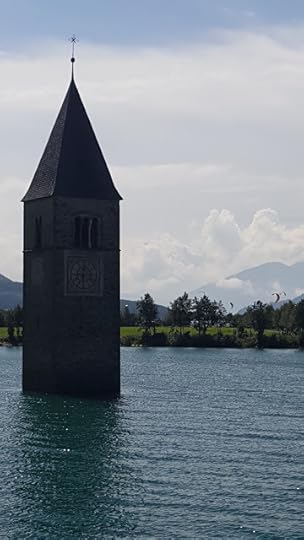 It's been a busy year. Sometimes I kind of feel like the tower in that picture to the right, drowing in stuff to do. This is one reason you haven't seen much from me here at I Must Be Off! apart from the wildly successful annual travel writing competition. I'm so glad and frankly stunned that so many people around the world sent in their adventures this year--647 to be exact. The Top 18 stories are of course here at I Must Be Off! Stop by and read them anytime. They'll be here. And they'll continue to be amazing.
It's been a busy year. Sometimes I kind of feel like the tower in that picture to the right, drowing in stuff to do. This is one reason you haven't seen much from me here at I Must Be Off! apart from the wildly successful annual travel writing competition. I'm so glad and frankly stunned that so many people around the world sent in their adventures this year--647 to be exact. The Top 18 stories are of course here at I Must Be Off! Stop by and read them anytime. They'll be here. And they'll continue to be amazing.I've been traveling, and I've been writing. Somehow, though, I haven't found the time to write about my travels. I Must Be Off! began as a way to keep up with my travels so that I never forget where I've been and what I've learned from being there. So far this year, I've learned that I'm embarrassingly forgetful. Even now I'm having a hard time remembering where I've been this year. Last Monday I returned from a trip to the Caribbean. Let's start there.
"Is hurricane season over?" I ask to no one in particular. Unsurprisingly no answer comes. I could have Googled it, but I didn't.
So we set off for Miami from Munich via Berlin. It's sunny and warm in Miami. It's Veteran's Day, and there's a parade at Miami Beach. It's a poorly attended affair. And that somehow feels right. Why on earth do we celebrate war? I get it that we should respect the sacrifice of those who served in the military, and we should certainly mourn the dead and provide assistance to their survivors. A parade feels like the wrong sort of tribute to these people. I wish we knew more exactly why the United States goes to war in the first place, or for that matter why anyone does. My companions and I walk away from the parade. The Germans I'm with don't understand what's going on. They see the whole thing as cheap and demeaning. And I have to agree.
 The AIDA cruise we're on stops in Port Canaveral for the Kennedy Space Center, which is worth a visit, San Juan (Puerto Rico), which is also worth a visit. Then we stop in St. Thomas, Cayo Levantado (Dominican Republic), and Nassau (Bahamas)--none of which are worth a visit. There is so much trash on the beach of Cayo Levantado that AIDA gives everyone on the excursion half their money back. Magens Beach on St. Thomas is supposed to be one of the best beaches in the world. Really? Who makes these lists? First of all, you have to pay to enter, and then it's just a tiny, completely normal beach with a bad-food snack stand and bar. It has a summer camp feel to it that does not say "Best Beach in the World". Nassau is an ugly place jammed with souvenir shops and fried fish for everyone. But at least the Kennedy Space Center was great.
The AIDA cruise we're on stops in Port Canaveral for the Kennedy Space Center, which is worth a visit, San Juan (Puerto Rico), which is also worth a visit. Then we stop in St. Thomas, Cayo Levantado (Dominican Republic), and Nassau (Bahamas)--none of which are worth a visit. There is so much trash on the beach of Cayo Levantado that AIDA gives everyone on the excursion half their money back. Magens Beach on St. Thomas is supposed to be one of the best beaches in the world. Really? Who makes these lists? First of all, you have to pay to enter, and then it's just a tiny, completely normal beach with a bad-food snack stand and bar. It has a summer camp feel to it that does not say "Best Beach in the World". Nassau is an ugly place jammed with souvenir shops and fried fish for everyone. But at least the Kennedy Space Center was great.And before the Caribbean we were in Italy, Spain, Greece, Croatia and of course Ireland, which we left permanently in April. If my life slows down a bit in the coming days, I'll write a bit about The Way of the Gods near Naples, Italy.
I have been writing, and in 2016 I've been fortunate to have several stories published. If you have time, I'd be so grateful for you to read them. Most of them were published in online journals, so they are free to read. Reading them sends these journals traffic, and they love (and deserve) traffic. Thank you to the editors who chose and published the following stories:
Fred's Massive Sorrow -- Eclectica Magazine's 20th-Anniversary Speculative Anthology (print), Nominated for storySouth's Million Writers Award
My Little Cuckoos -- Literal Latté, Third Place in K. Margaret Grossman Fiction Award
The Air Between Us -- Juked
The Guy I Used to Date -- FRiGG
What I Need to Tell the People on the Train -- FRiGG
Everything We Had -- The Journal of Compressed Creative Arts, Nominated for Best Small Fictions
Target Practice -- Chicago Literati
My Boy Winston -- Blue Fifth Review: Blue Five Notebook Series
Wile E. -- r.kv.r.y quarterly literary journal
Everything that Matters in Life and Death -- Jersey Devil Press
To Carry Her Home -- forthcoming in the Bath Flash Fiction Anthology (December 2016), shortlisted for the Bath Flash Fiction Award
Again, thank you so much to the editors of these journals.
It's been an eventful year, and it's not over. I wish you all a relaxing, stress-free holiday time. I'll be off to Israel, and I hope to have time to share my adventure with you.
I must be off,
Christopher
__________________________________________
Christopher Allen is the author of Conversations with S. Teri O'Type (a Satire), an episodic adult cartoon about a man struggling with expectations. Allen's writing has appeared or is forthcoming in Juked, Eclectica Magazine's 20th-Anniversary Speculative anthology, Indiana Review, FRiGG, The Journal of Compressed Creative Arts, and over a hundred other great places. Read his book reviews in [PANK], Necessary Fiction, Word Riot, The Lit Pub, and others. His creative non-fiction has appeared in Chicken Soup for the Soul, Bootsnall Travel, and lots of other fine places. A finalist at Glimmer Train in 2011, Allen has been nominated for Best of the Net, the storySouth Million Writers Award, and the Pushcart Prize. He is the 2015 recipient of Ginosko Literary Journal's award for flash fiction and in 2016 took third place in the K. Margaret Grossman fiction award given by Literal Latté. Allen is the managing editor of SmokeLong Quarterly.
Published on December 08, 2016 14:15
October 28, 2016
The Lost Story of the William & Mary: An Inter-Review with Gill Hoffs
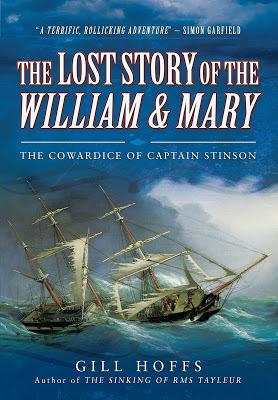 A ship is impaled on a rock in a sea swarming with sharks 1200 miles from home. Worse yet, the almost 200 passengers on board the William & Mary have been abandoned by a cowardly captain. Nearly 200 European emigrants, each with their personal stories, fighting disease, corruption and the mercilessness of the sea. All of this Gill Hoffs brings alive in her new book, The Lost Story of the William & Mary: the Cowardice of Captain Stinson. At the hands of a less stalwart writer, this story might have been tamed, sanitized with a bit of fake grime and a couple of Hollywood heartthrobs, but Hoffs never shies away from the filth and horror of reality. We see and smell and feel every moment of tragedy—but also salvation.
A ship is impaled on a rock in a sea swarming with sharks 1200 miles from home. Worse yet, the almost 200 passengers on board the William & Mary have been abandoned by a cowardly captain. Nearly 200 European emigrants, each with their personal stories, fighting disease, corruption and the mercilessness of the sea. All of this Gill Hoffs brings alive in her new book, The Lost Story of the William & Mary: the Cowardice of Captain Stinson. At the hands of a less stalwart writer, this story might have been tamed, sanitized with a bit of fake grime and a couple of Hollywood heartthrobs, but Hoffs never shies away from the filth and horror of reality. We see and smell and feel every moment of tragedy—but also salvation.As in Hoffs’ first book about a shipwreck, The Sinking of RMS Tayleur, Hoffs brings us a meticulously researched account of a harrowing disaster at sea. This review is also an interview. I’ve asked Gill Hoffs to talk a bit about the process of writing The Lost Story of the William & Mary, available now from Pen & Sword Books.
IMBO: Gill, just how much research goes into projects like these, and what was the most difficult aspect of the research?
Hoffs: Thanks for having me here, Chris, and for the review! The short answer is, a lot. Here’s the longer one: after the initial online exploration to see whether there are enough survivor/witness accounts to allow a whole book (and to check another author hasn’t beaten me to it) I’ll spend a couple of months on sites like the British Newspaper Archive, Trove, Ancestry, and FindMyPast, immersing myself in information. I’ll take another few months to look up everyone involved – though if someone’s name is common it’s usually a fruitless endeavor – and to read around the subject, find out about contemporary events and similar shipwrecks, and have a damn good think.
Throughout this, I’ll also be contacting complete strangers via social media, Ancestry accounts, forum message boards, and institutions for further information on related matters. With the William & Mary book, for example, I spent a while discussing oorijzer (a type of head ornament worn by the Frisian women on board) with people in museums and universities around the world. For the Tayleur, I was very grateful to a doctor at Harvard who took the time to discuss TBI (Traumatic Brain Injury) with me in relation to this Victorian shipwreck.
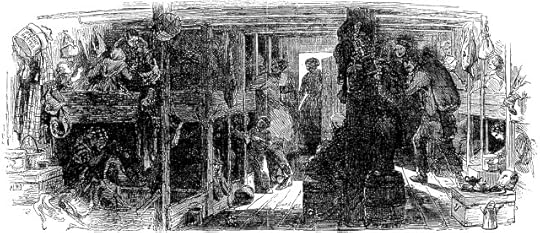 Below deck on an emigrant shipWhile I’m writing the first draft, which takes up to two months, I’ll still be researching people and places, and the same goes for subsequent drafts when my editor or advance readers may flag something up requiring explanation or elaboration. As for the hardest part, well, it’s probably no surprise to anyone who knows me or follows me on twitter that it’s the emotional toll of the research that’s the most difficult part of the job for me. Even though I obviously know who lives and who dies in these wrecks – and by now that generation is long dead anyway – I can’t help but root for these people and grieve when I have to relate their demise and imagine it in often gory detail. My books are memorials to the long-forgotten dead and it’s important to document what happened and, if possible, why. I get through some amount of Kleenex (and Nutella) though.
Below deck on an emigrant shipWhile I’m writing the first draft, which takes up to two months, I’ll still be researching people and places, and the same goes for subsequent drafts when my editor or advance readers may flag something up requiring explanation or elaboration. As for the hardest part, well, it’s probably no surprise to anyone who knows me or follows me on twitter that it’s the emotional toll of the research that’s the most difficult part of the job for me. Even though I obviously know who lives and who dies in these wrecks – and by now that generation is long dead anyway – I can’t help but root for these people and grieve when I have to relate their demise and imagine it in often gory detail. My books are memorials to the long-forgotten dead and it’s important to document what happened and, if possible, why. I get through some amount of Kleenex (and Nutella) though.IMBO: There are so many individual tragedies: the deaths of children, the separation of wives from their husbands and children, disease and betrayal. One in particular is Trijntje de Haan, a woman who holds on to her prized possessions until one last horrible moment when a crew member snatches it away from her.
Gill, How do these details persist, and aren’t they so full of cinematic potential?
Hoffs: When I read old newspapers etc. it’s immediately clear which individuals should be focused on to carry the reader through my book and which people, sadly, haven’t left enough details behind in online-available accounts and descriptions to allow me to tell their stories in full. Women and children often appear in contemporary reports of these wrecks as “wife of” or “child of” with no further details given, which is utterly infuriating. Whenever I can restore their identities and redress this imbalance, I do, so when I read of Treen’s awful experience in a way I was pleased because I knew it was something I just had to include, and that it would affect readers – I always hope my books will have some kind of emotional impact, it seems the least I can do for the people on these wrecks: we should feel for them. I haven’t lost children as she did on that long and awful voyage across the Atlantic, but I have had four miscarriages and keep my own ‘memory box’ of half-finished home-made baby blankets and scan pictures, and I know I would be gutted to lose them.
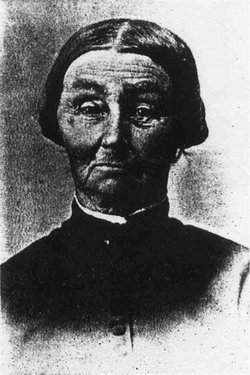 Trijntje (Catherine Tuininga) Albers de Haan, Copyright Christopher Lindstrom
Trijntje (Catherine Tuininga) Albers de Haan, Copyright Christopher LindstromI read fast but retain little, and I trust my brain to let key moments and telling details ‘stick’. The bits I find myself recounting to my Nana over the phone always end up in my books, like Treen losing her treasured bag of mementoes during the rescue, a fellow emigrant describing another member of their party somewhat scathingly as “not exactly the inventor of the steam-engine”, and a survivor writing home to his parents “I think I will like living here. Americans eat pork three times a day and beef and that is a bright prospect for me.” I think journalists from back then had those same instincts and their articles are often crammed with details meant to engage readers who may have never been to sea or even seen a large body of water, which work 160+ years later in involving other people – myself and my own readers – with these tales of strange events in stranger times.
As for cinematic potential, well, my Most Asked Questions from readers are “When is this going to be a film?” and “Why hasn’t this been made into a film already?” – and that goes for both of my shipwreck books. Little would make me happier than seeing these shipwrecks on the big screen, especially if we could get actual descendants in as extras for the crowd scenes on board!
IMBO: One aspect of Hoffs’ writing I love is that she places the shipwreck in historical context. In this case, the milieu is mid-nineteenth-century Europe, a time and place of dire crisis with millions of desperate people on the move to find a better life. Where there are millions of desperate people, there will be corrupt men there to take advantage of their plight.
Gill, what similarities and differences do you see between the situation almost 200 years ago and today’s immigrant crisis?
Hoffs: I’m glad you picked up on this, Chris. I was writing this book around the time that photo of a washed up toddler hit the headlines and it really rammed home the point that all these generations later, all this progress later, we stillhave the same problems: with safety at sea, and with each other. No-one can choose the time or place to exit their mother’s womb so it astonishes me to see apparently rational and decent people decide whether to treat someone with respect and compassion on the basis of geography, politics, and nearness – or how much melanin is present in their skin. The only difference between then and now is that we have fewer excuses for misbehavior and ignorance.
IMBO: I see this book as a movie. Nothing would please me more than seeing the rights sold to a major studio. This cinematic vision begins with Shakespeare: “Ships are but boards, sailors but men” and evolves into an epic story of human nature, Good (Captain Sands) balancing/shaming Evil (Captain Stinson).
Gill, are there plans to approach a studio? Have you thought of turning this into a screenplay?
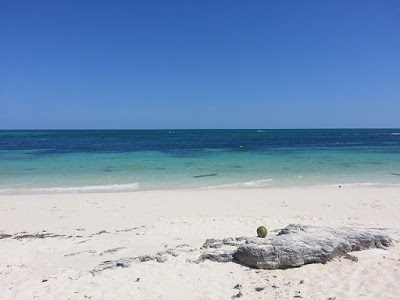 Port Lucaya BeachHoffs: Yes! The cowardly Captain Stinson continues to fascinate me – though I’d rather be at sea with the heroic wrecker Robert “Amphibian” Sands for obvious reasons! I did try sending James Cameron my ‘Victorian Titanic’ book but unfortunately the address I had was no longer in use. I absolutely agree that these shipwreck stories are prime candidates for adaptation, and when I’m writing the books it feels as if I’m describing the footage of the wreck as it plays in my head. If anyone has any suggestions I’m all ears and they are most welcome to contact myself or my nonfiction agent Jennie Goloboy of Red Sofa Literary Agency. As for writing screenplays, I’d rather write the books and act in an advisory role for the film (and as an extra with the descendants!) than cut my teeth on something so important to me.
Port Lucaya BeachHoffs: Yes! The cowardly Captain Stinson continues to fascinate me – though I’d rather be at sea with the heroic wrecker Robert “Amphibian” Sands for obvious reasons! I did try sending James Cameron my ‘Victorian Titanic’ book but unfortunately the address I had was no longer in use. I absolutely agree that these shipwreck stories are prime candidates for adaptation, and when I’m writing the books it feels as if I’m describing the footage of the wreck as it plays in my head. If anyone has any suggestions I’m all ears and they are most welcome to contact myself or my nonfiction agent Jennie Goloboy of Red Sofa Literary Agency. As for writing screenplays, I’d rather write the books and act in an advisory role for the film (and as an extra with the descendants!) than cut my teeth on something so important to me.IMBO: Hoffs’ boundless curiosity drives her work. It’s beyond evident that this is a writer who loves digging for the golden details. I’m also a writer who can’t get enough of the details. After reading Hoffs' book, I can now tell you what costiveness meant to the Victorians (constipation) and what a jolly boat is (a tender). I now know that bacon is good for a fever. Actually bacon is good. Period. But to discover that at least one Victorian doctor in the mid-nineteenth century included bacon as a treatment for fever is priceless.
Gill, what detail shocked you the most as you were doing your research?
Hoffs: Prescribing bacon for a fever struck me as somewhat absurd and it’s not something I would necessarily recommend myself!I think what shocked me the most was finding out about the hatchet murders. I could well imagine the desperation involved with swimming for the departing longboat despite the threat of sharks, reaching for the side of the boat as their feet thrust through the water, and seeing the hatchet fall in the early morning sunlight. It makes me feel sick at heart. The captain and crew were responsible for their human cargo’s well-being and survival and had lived beside them in close quarters for six weeks. They knew of the emigrants’ hopes for the future, their families and friends, and their turns of phrase. To then not only abandon them to almost-certain death but actually hack at some of their fellow travellers with a hatchet and kill them is, to me, unforgivable.
IMBO: Hoffs’ The Lost Story of the William & Mary: the Cowardice of Captain Stinson is a page-turner full of the voices of the people who were present, the people who were fighting for their lives on this fated voyage. Gill Hoffs’ generous and vivid portrayal of this tragedy provides us with a vital record and testimony to the courage and fate of the migrant.
Brava, Gill!
Hoffs: Thank you, that means a lot to me. In case anyone reading this interview is thinking “I reckon my ancestor had something to do with the Tayleur or the William & Mary…”, my email address is gillhoffs@hotmail.co.uk – I love to hear from descendants, it’s a privilege to be able to answer questions (if I can) and even incorporate information received into future editions of my books.
IMBO: I Must Be Off! readers, be sure and comment below. One lucky person will win a copy of Gill Hoffs' book. A few weeks after this inter-review runs, I'll draw names out of a hat. You'll love this book, so make sure you leave a comment.
I must be off,
Christopher
_____________________________________
Christopher Allen is the author of Conversations with S. Teri O'Type (a Satire), an episodic adult cartoon about a man struggling with expectations. Allen's writing has appeared or is forthcoming in Juked, Eclectica Magazine's 20th-Anniversary Speculative anthology, Indiana Review, FRiGG, The Journal of Compressed Creative Arts, and over a hundred other great places. Read his book reviews in [PANK], Necessary Fiction, Word Riot, The Lit Pub, and others. His creative non-fiction has appeared in Chicken Soup for the Soul, Bootsnall Travel, and lots of other fine places. A finalist at Glimmer Train in 2011, Allen has been nominated for Best of the Net, the storySouth Million Writers Award, and the Pushcart Prize. He is the 2015 recipient of Ginosko Literary Journal's award for flash fiction and in 2016 took third place in the K. Margaret Grossman fiction award given by Literal Latté. Allen is the managing editor of SmokeLong Quarterly.
Published on October 28, 2016 04:00



